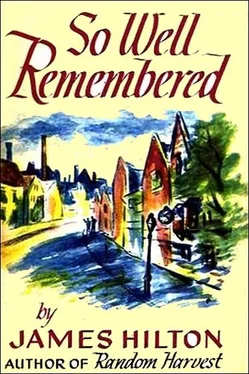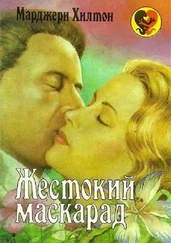Джеймс Хилтон - So Well Remembered
Здесь есть возможность читать онлайн «Джеймс Хилтон - So Well Remembered» весь текст электронной книги совершенно бесплатно (целиком полную версию без сокращений). В некоторых случаях можно слушать аудио, скачать через торрент в формате fb2 и присутствует краткое содержание. Год выпуска: 1945, Жанр: Проза, на английском языке. Описание произведения, (предисловие) а так же отзывы посетителей доступны на портале библиотеки ЛибКат.
- Название:So Well Remembered
- Автор:
- Жанр:
- Год:1945
- ISBN:нет данных
- Рейтинг книги:5 / 5. Голосов: 1
-
Избранное:Добавить в избранное
- Отзывы:
-
Ваша оценка:
- 100
- 1
- 2
- 3
- 4
- 5
So Well Remembered: краткое содержание, описание и аннотация
Предлагаем к чтению аннотацию, описание, краткое содержание или предисловие (зависит от того, что написал сам автор книги «So Well Remembered»). Если вы не нашли необходимую информацию о книге — напишите в комментариях, мы постараемся отыскать её.
So Well Remembered — читать онлайн бесплатно полную книгу (весь текст) целиком
Ниже представлен текст книги, разбитый по страницам. Система сохранения места последней прочитанной страницы, позволяет с удобством читать онлайн бесплатно книгу «So Well Remembered», без необходимости каждый раз заново искать на чём Вы остановились. Поставьте закладку, и сможете в любой момент перейти на страницу, на которой закончили чтение.
Интервал:
Закладка:
So I looked up Carrigole on the map and found it was a dozen miles from Galway—a small place, not very accessible, in a district of lakes and mountains. And that’s why I asked you, Boswell, if you ever knew the Winslows in Ireland, because I should have liked your opinion of Carrigole.
It began to rain when I first came within sight of it. I had hired a car for the last stage of the trip and all the way I felt oddly excited about getting there. Actually I had never been in Ireland before, and crossing the country from Dublin it had occurred to me that even the trains were antique —and not contemptibly, as on so many outdated railways all over the world, but honourably, with dignity, like good sound Victorian mahogany furniture. And when, at Galway, my train reached its destination, there was again the contrast with other rail-heads I had seen; for here was no mere petering out into obscurity, but a grand finale in stone—the massive quayside station, far too large and almost quiet as a cathedral, shaking a granite fist into the sea.
But my first glimpse of Carrigole was equally memorable—or perhaps the mood I was in gave me extra percipience—a kind of mystic awareness I am naturally distrustful of, but can’t deny exists, at certain rare times and places. I knew Ireland was supposed to be like that, and therefore I was perversely surprised to find it so. Through the rainswept windows of the car I saw blue smoke drifting over the roofs of whitewashed cottages, and beyond them a mountain rising into clouds that totally covered the summit. I gathered, from the map on my knee, that this must be Slieve Baragh, not much higher than a hill, yet as I saw it then for the first time it seemed in another world of measurement. Presently the car slowed down for the village, and here the swollen clouds dipped lower, bringing no raindrops but emptying silently; Slieve Baragh was now hidden behind a curtain that suggested Himalayan heights—and yet, I remembered again, it was not much of a mountain—a mere two thousand feet. I couldn’t help making other mental notes of the near and the practical—the uneven walls and mud-brown pavements, the butcher who called himself a ‘flesher’ and the chemist’s shop magnificently styled a ‘Medical Hall’. I wound down the side window to catch the whiff of peat on the wet breeze as the car bumped over a bridge across a river—only a minor river, like the minor mountain, but turbulent now as it filled almost directly from the sky.
A mile or so past the village the Winslows’ house stood behind a drenched garden, and Jeffrey was waiting at the gate in the rain. He looked pale and worn, and there was intense nervousness in the way he greeted me.
I ought to describe the house; it was substantially built, thick- walled and small-windowed, in a style conditioned by roaring Atlantic gales for half the year, and political troubles for half a century. These indeed had left the house with its most conspicuous attribute—a large, burnt-out wing, blackened and roofless, which provided a ready topic of conversation. “They tried to burn the whole place down in ‘twenty-two,” Jeffrey explained. “Livy got it cheap because it hadn’t been lived in since then and needed so much repairing, but part of it’s beyond repair—it would be too large for us, anyway. We have a couple of servants and the boy when he’s home from school—that only makes five…”
By then we were in the square hall, from which the main rooms of the house opened on all sides, and it was there that Livia met me. Perhaps because of the dark afternoon it seemed to me that she appeared from nowhere, a sudden distillation of shadows. I was not surprised when she greeted me as a stranger, allowing Jeffrey to make the unnecessary introduction. I played up accordingly and thought it equally unnecessary when, a few minutes later in the bedroom I had been shown to, she closed the door behind her and said with a sort of conspiratory quietness: “Jeffrey still doesn’t know I came to see you in London.”
I nodded and said I would have surmised that he didn’t.
“And of course he doesn’t know anything else either.”
I knew what she meant, and I nodded to that also.
“I hope you won’t ever repeat what I told you in confidence,” she went on.
I said temporizingly and in the bland way which I have cultivated as part of my official equipment: “My dear Mrs. Winslow, I wasn’t aware that you were telling me anything in confidence, but as a matter of fact I don’t usually gossip.” I added, to change the subject: “It’s so kind of you to have me here, and I hope it isn’t too much trouble.”
“Not at all,” she answered, with cold politeness. “You’re on your way to Limerick, aren’t you?”
That was as broad a hint as I needed, and clear proof of what I had already guessed—that she didn’t want me to stay, and that Jeffrey had invited me either without her knowledge or against her wishes. I had guessed this subconsciously enough to have wired my time of arrival too late for any cancellation of the invitation—and, as it happened, too late even for Jeffrey to meet me at Galway.
“Yes,” I said. “I’m on my way to Limerick.”
I had a bath, changed into drier tweeds, and went down to dinner. I met the boy then, Charles I think his name was—a youth of thirteen, at Charterhouse—tall, good-looking, shy, likable. Intelligent, too, as I discovered after a few casual remarks. He was piling turf on the old-fashioned fire as I entered, for it was chilly enough to have one, and that set us talking of turf and electricity, old and new, the Shannon hydro-electric scheme and the ancient Irish tongue that nobody spoke except illiterate peasants and modern school teachers. Livia then said: “We’re all half mad with our opposites,” which seemed to end rather than clinch any discussion. She had a curious way of saying things that were never quite clear, yet never so meaningless as to be easy to ignore. Jeffrey noticed my interest in the boy and soon found a chance to tell me, like any other proud father, that Charlie was keen on music and by no means a bad piano-player. We went on chatting desultorily throughout the meal; then the boy made a polite excuse and left us three adults together. I somehow had an impression that he got on better with his father than with Livia, accepting the shy approach more readily than the frontal assault; and it has amused me since to reflect that Livia ranged against the polite taboos of the English public-school system would be a unique example of an irresistible force meeting an immovable body.
After he had gone there was a change of atmosphere that became almost baleful; it had been tense before, but now it was menacing, a curious hostility between Jeffrey and Livia that was due, I could not help feeling, to my own presence. A sort of invisible cat crouching on the table-top to spring at any of our throats at an unknown signal—if the metaphor isn’t too far-fetched. In an attempt to ease the conversation into some harmless groove I said, unimportantly: “It’s probably not a good day to sight-see, but I did at least get a good whiff of Ireland as I drove over.”
Livia answered, as if she must dispute with me at all costs: “It IS a good day to sight-see. Ireland’s a sad country, so you see it best when it looks sad, but the sadness is alive—it comes out of the earth—it isn’t like the dead sadness of London, especially the West End.”
“Oh, come now,” I said facetiously. “The Café Royal at midnight hasn’t got much dead sadness.”
“Jeff and I love it here,” she went on defensively, as if I had ever denied it. “That is, he could if he wanted to,” she added, as if Jeffrey had ever denied it.
“But what do you do all the time?” I asked, still facetiously.
Читать дальшеИнтервал:
Закладка:
Похожие книги на «So Well Remembered»
Представляем Вашему вниманию похожие книги на «So Well Remembered» списком для выбора. Мы отобрали схожую по названию и смыслу литературу в надежде предоставить читателям больше вариантов отыскать новые, интересные, ещё непрочитанные произведения.
Обсуждение, отзывы о книге «So Well Remembered» и просто собственные мнения читателей. Оставьте ваши комментарии, напишите, что Вы думаете о произведении, его смысле или главных героях. Укажите что конкретно понравилось, а что нет, и почему Вы так считаете.










